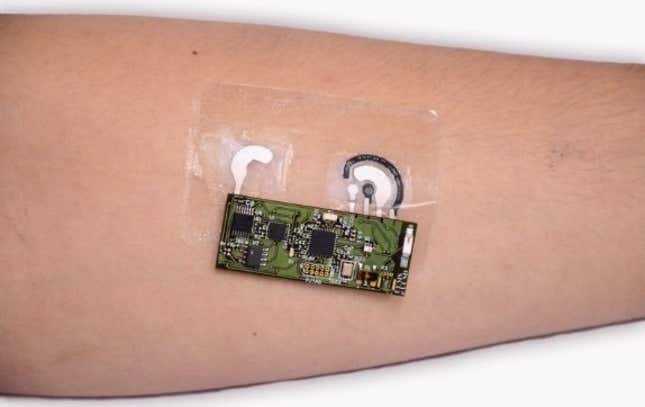Getting behind the wheel after one too many drinks? A tattoo might be your savior.
Devices currently used to measure drunkenness, typically used only by the police after stopping a motorist, have their pitfalls. Blood alcohol concentration (BAC) is the most accurate indicator of a person’s alcohol level, but it requires pricking a finger. Breathalyzers, which are the most commonly used devices to detect BAC, are non-invasive, but they can give false readouts.
A team of researchers at University of California San Diego (UCSD) designed a “temporary tattoo” with an electronic sensor that allows drinkers to check their own sobriety. The tattoo with a small electronic board magnetically attached to it is stuck on a user’s skin. The tattoo delivers a drug called pilocarpine, which generates sweat on the surface of the skin. Sensors in the tattoo measure the alcohol, or ethanol, content in the sweat. The electronic board then transmits the information to a user’s phone via bluetooth. ”We developed a new tattoo-based wearable alcohol sensor that enables real-time monitoring of blood alcohol level, overcoming limitations of conventional non-invasive alcohol sensors,” Jayoung Kim, a co-author and PhD student at UCSD.

Nine healthy volunteers wore the device on their arms before and after consuming alcohol. ”On-body results with human subjects show distinct differences in the current response before and after alcohol consumption, reflecting the increase of ethanol levels,” according to the results published in the journal ACS Sensors.
Transdermal bracelets have also been developed that can track alcohol consumption. Earlier this year, the U.S. government awarded a $200,000 first prize to San Francisco-based BACtrack for developing the prototype of a wrist wearable that detect traces of alcohol diffusing through the skin, IEEE Spectrum reported. The device works by measuring alcohol in sweat or vapor from the skin but results can be delayed by hours. The tattoo-based system claims to work in near-real time.
To make the sensors in the tattoo ”all the electrodes were fabricated by a screen-printing technique,” which costs less than $1, Kim said in an interview. The same apparatus can also be used to track glucose and lactase levels. The next step for the researchers is to personalize the device and develop a more user friendly smartphone application.




